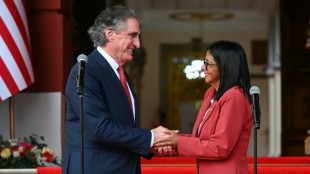-
 US says Venezuela to protect mining firms as diplomatic ties restored
US says Venezuela to protect mining firms as diplomatic ties restored
-
Trump honors Messi and MLS Cup champion Miami teammates

-
 Dismal Spurs can still avoid relegation vows Tudor
Dismal Spurs can still avoid relegation vows Tudor
-
Berger sets early pace at Arnold Palmer with 'unbelievable' 63

-
 Morocco part company with coach Regragui as World Cup looms
Morocco part company with coach Regragui as World Cup looms
-
Lens beat Lyon on penalties to reach French Cup semis

-
 El Salvador's Bukele holding dozens of political prisoners: rights group
El Salvador's Bukele holding dozens of political prisoners: rights group
-
With Iran war, US goes it alone like never before

-
 Spurs slip deeper into relegation trouble after loss to Palace
Spurs slip deeper into relegation trouble after loss to Palace
-
European, US stocks back in sell-off mode as oil prices surge

-
 Pete Hegseth: Trump's Iran war attack dog
Pete Hegseth: Trump's Iran war attack dog
-
Celtics' Tatum could make injury return on Friday

-
 'Enemy at home': Iranian authorities tighten grip as war rages
'Enemy at home': Iranian authorities tighten grip as war rages
-
Bethell set for 'hell of a career', says England captain Brook

-
 France coach Galthie slams Scotland for 'smallest changing room in the world'
France coach Galthie slams Scotland for 'smallest changing room in the world'
-
Medvedev arrives in Indian Wells after being stranded in Dubai

-
 Trump fires homeland security chief Kristi Noem
Trump fires homeland security chief Kristi Noem
-
Mideast war risks pulling more in as conflict boils over

-
 Wales' James Botham 'sledged' by grandfather Ian Botham after Six Nations error
Wales' James Botham 'sledged' by grandfather Ian Botham after Six Nations error
-
India hero Samson eyes 'one more' big knock in T20 World Cup final

-
 Britney Spears detained on suspicion of driving while intoxicated
Britney Spears detained on suspicion of driving while intoxicated
-
Grooming makes Crufts debut as UK dog show widens offer

-
 Townsend insists Scots' focus solely on France not Six Nations title race
Townsend insists Scots' focus solely on France not Six Nations title race
-
UK sends more fighter jets to Gulf: PM

-
 EU to ban plant-based 'bacon' but veggie 'burgers' survive chop
EU to ban plant-based 'bacon' but veggie 'burgers' survive chop
-
Leagues Cup to hold matches in Mexico for first time

-
 India reach T20 World Cup final after England fail in epic chase
India reach T20 World Cup final after England fail in epic chase
-
Conservative Anglicans press opposition to Church's first woman leader

-
 Iran players sing anthem and salute at Women's Asian Cup
Iran players sing anthem and salute at Women's Asian Cup
-
India beat England in high-scoring T20 World Cup semi-final

-
 Mideast war traps 20,000 seafarers, 15,000 cruise passengers in Gulf
Mideast war traps 20,000 seafarers, 15,000 cruise passengers in Gulf
-
Italy bring back Brex to face England

-
 French policeman to be tried over 2023 killing of teen
French policeman to be tried over 2023 killing of teen
-
Oil prices rise, stocks slide as Middle East war stirs supply concerns

-
 More flights take off despite continued fighting in Middle East
More flights take off despite continued fighting in Middle East
-
Ukraine, Russia free 200 POWs each

-
 Middle East war halts work at WHO's Dubai emergency hub
Middle East war halts work at WHO's Dubai emergency hub
-
Paramount's Ellison vows CNN editorial independence

-
 US says attacks on alleged drug boats have spooked traffickers
US says attacks on alleged drug boats have spooked traffickers
-
Dempsey returns as Scotland shuffle pack for Six Nations clash against France

-
 India pile up 253-7 against England in T20 World Cup semi-final
India pile up 253-7 against England in T20 World Cup semi-final
-
Wary Europeans pledge 'defensive' military aid in Mideast war

-
 Seven countries to boycott Paralympics ceremony over Russia: organisers
Seven countries to boycott Paralympics ceremony over Russia: organisers
-
UK's Crufts dog show opens with growing global appeal

-
 PSG prepare for Chelsea clash with Monaco rematch
PSG prepare for Chelsea clash with Monaco rematch
-
Google opens AI centre as Berlin defends US tech reliance

-
 Second Iranian ship nears Sri Lanka after submarine attack
Second Iranian ship nears Sri Lanka after submarine attack
-
Portugal mourns acclaimed writer Antonio Lobo Antunes

-
 Union loses fight against Tesla at German factory
Union loses fight against Tesla at German factory
-
Wales revel in being the underdogs, says skipper Lake

Boomers: Selfish or Scapegoats?
The debate over whether the Baby Boomer generation—those born between 1946 and 1964—deserves the label of "the most selfish generation in history" has intensified in recent years. Critics argue that Boomers have prioritised their own comfort and prosperity at the expense of future generations, while defenders point to their contributions to social progress and economic growth. This article explores both sides of the argument, drawing on economic, social, and cultural factors to assess the validity of the claim.
A Generation of Prosperity
The post-World War II era was a time of unprecedented economic growth, particularly in Western nations. Boomers grew up in a period of relative stability and prosperity, benefiting from expanding educational opportunities, affordable housing, and a booming job market. This generation was the first to enjoy the fruits of modern consumer culture, with access to new technologies, healthcare advancements, and a welfare state that provided a safety net. However, this prosperity has been criticised as a double-edged sword. While Boomers thrived, they are accused of failing to address long-term challenges such as climate change, economic inequality, and the sustainability of social security systems. The argument goes that their focus on short-term gains has left younger generations—particularly Millennials and Generation Z—facing a future of environmental degradation, housing crises, and precarious employment.
The Burden of Debt
One of the most frequently cited examples of Boomer selfishness is their approach to public debt. Over the past few decades, national debts have soared in many countries, driven by policies that prioritised tax cuts, increased spending on entitlements, and economic stimulus measures. Critics argue that Boomers, who have held political and economic power during this period, have been complicit in passing on this financial burden to future generations. The rising cost of healthcare, pensions, and social security, combined with stagnating wages for younger workers, has fuelled resentment. In some nations, national debt has increased dramatically since the turn of the century, a period during which Boomers dominated leadership positions. This fiscal irresponsibility, some argue, reflects a generational disregard for the future.
The Housing Divide
Housing is another area where Boomers are accused of hoarding wealth. In many developed countries, property prices have skyrocketed, making homeownership increasingly unattainable for younger generations. Boomers, who bought homes when prices were relatively low, have seen their property values soar, creating a wealth gap that is difficult for Millennials and Gen Z to bridge. Over the past few decades, average house prices have risen significantly while wages have remained largely stagnant. This has led to accusations that Boomers have pulled up the ladder behind them, benefiting from policies that favoured property ownership while younger generations are left renting or struggling to save for deposits.
A Legacy of Progress
However, it would be unfair to paint the entire generation with the same brush. Boomers have also been responsible for significant social progress. The civil rights movements of the 1960s and 1970s, which fought for racial equality, gender rights, and LGBTQ+ inclusion, were largely driven by Boomer activists. Their contributions to technology, healthcare, and education have also been transformative. The digital revolution, which laid the foundation for the modern internet and communication technologies, was spearheaded by Boomer innovators. Moreover, many Boomers have engaged in philanthropy and community service, challenging the notion that they are universally selfish.
Generational Perceptions
Another important factor to consider is the role of generational differences in shaping perceptions of selfishness. Younger generations, facing economic uncertainty and environmental crises, may view Boomers' actions through a lens of frustration. However, it is worth noting that every generation has faced criticism from its successors. The Silent Generation, who preceded the Boomers, were often derided for their conformity and conservatism, while Millennials have been labelled as entitled and overly reliant on technology. This cyclical nature of generational criticism suggests that the "selfish" label may be more a reflection of changing societal values than an objective truth.
Structural Influences
Furthermore, the accusation of selfishness overlooks the structural factors that have shaped Boomer behaviour. The economic policies of the late 20th century, particularly the rise of neoliberalism, encouraged individualism and short-term thinking. Boomers, like all generations, were influenced by the prevailing ideologies of their time. The shift towards deregulation, privatisation, and globalisation was not solely a Boomer creation but a broader political and economic trend. To single out Boomers as uniquely selfish ignores the complex interplay of historical forces that have shaped modern society.
Conclusion
In conclusion, while there is evidence to suggest that the Boomer generation has benefited disproportionately from economic and social conditions, labelling them as "the most selfish generation in history" is an oversimplification. Their contributions to social progress and innovation cannot be ignored, nor can the structural factors that have influenced their behaviour. The intergenerational debate is likely to continue, but it is essential to approach it with nuance, recognising that each generation operates within the constraints and opportunities of its time.

EU: Military spending is on the rise!

Crisis: EU bicycle production drops!

EU: Foreign-controlled enterprises?

EU DECODED: Deforestation law’s trade-offs

Underwater Wi-Fi: European startups woo investors

Trump's US support for Ukraine and China?

Cultural year 2024: between Qatar and Morocco

Planning a wellness break? Poland!

Studio Kremlin: creative co-working in Paris

Culture: Serbia’s architectural marvels

EU Residence permits: Record level to third nationals




